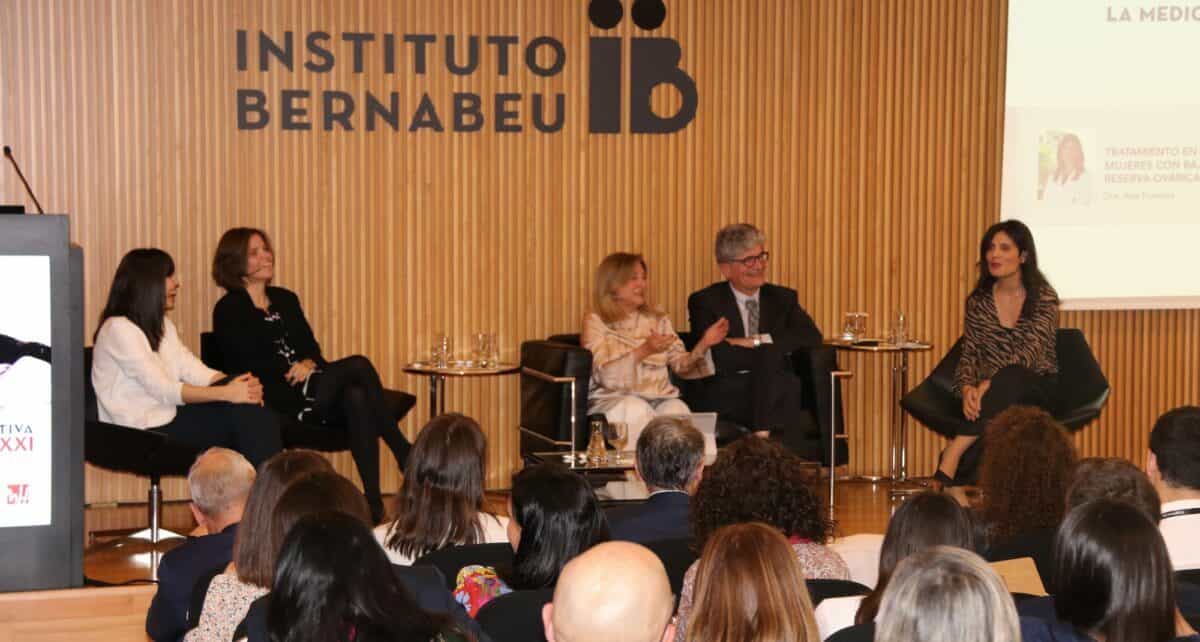Personalization based in genetics and AI, new keys to achieve pregnancy
16-03-2023

Instituto Bernabeu has gathered experts in assisted reproduction to talk about the main fertility challenges in this century and what are the science contributions to overcome them.
“Application of AI-based technology in our clinics is a real disruption and contributes to our patients receiving much more accurate diagnoses, better success rates and shorter fertility treatment times,” said Dr Andrea Bernabeu, Instituto Bernabeu medical co-director, during the medical meeting held this Friday to address the reproductive health of women in the 21st century. The conference was organised by Instituto Bernabeu together with the Chair of Community Medicine and Reproductive Health of the UMH.
During this meeting, which was attended by more than a hundred professionals, healthcare students and patient associations, the fertility experts addressed the challenges faced by reproductive medicine in achieving pregnancy when there are difficulties, and emphasised two aspects that are key: the individualisation of treatments and AI. “Today we are able to break statistical ceilings and manage to combine the most excellent scientific work, AI-based technology and data analysis, so our patients have the pregnancy they desire, with maximum guarantees and in the shortest possible time,” said Dr Bernabeu.
Treatments personalisation based on genetics is making possible to surpass the threshold of success that had already been reached in pregnancy rates and this is due to the unstoppable evolution of this science. “The study of each individual unique genetic profile influences susceptibility to certain diseases and predicts which treatments are safer and more effective,” summarises IB Biotech’s scientific director, Dr Belén Lledó. And the evolution is unstoppable: “it used to take months to sequence a gene, but now the genome can be sequenced in just a few days,” she says.
Hundreds of variables
Analysing hundreds of variables from thousands of patients helps to individualise treatments. Artificial Intelligence is already a tool both in the clinical part of the treatment and in the IVF laboratory. Among others, “AI is being applied to embryo selection to choose the one with higher implantation chances and resulting in pregnancy”. Algorithms are also being used to provide the most realistic and transparent prognosis for a patient by studying all the data, as a patient’s prognosis should not only depend on age, as not all women of the same age are the same. “We are integrating our data to give an objective and personalised report on each woman success rate” emphasises Dr Bernabeu.
Analysing hundreds of variables from thousands of patients helps to individualise treatments. Artificial Intelligence is already a tool both in the clinical part and in the IVF laboratory. Among others, “AI is being applied to embryo selection to choose the embryo that has the best implantation chances and resulting in pregnancy”. Algorithms are also being used to provide the most realistic and transparent prognosis for a patient by studying all the data, as a patient’s prognosis should not only depend on age; not all women of the same age are the same. “We are integrating our data to give an objective and personalised report on the success rate of each woman,” emphasises Dr Bernabeu.
Several studies have already been developed in the clinic based on the algorithms. One of them is an investigation that identifies the causes provoking early miscarriage; another, based on the study of 22 variables of paternal, maternal and embryo origin, predicts the possibility of embryos with altered chromosomes by presenting aneuploidies or mosaicism, which prevent pregnancy or lead to early miscarriage.
One of the most advanced medicines in the world
The field of reproductive medicine in Spain has not stopped evolving since its beginnings, with one of the most advanced legislations in the world. The unstoppable social progress, the great development of new techniques, the commitment to research and science-based improvements, have made it a reference country worldwide in this field.
Since Louise Brown was born in 1978, the first human being through in vitro fertilisation, 8 million people have been born thanks to assisted reproduction techniques. Today, between 5 and 11% of the European population has been born with the help of reproductive medicine. But reproductive medicine faces many challenges. One of them is the delay in the age of motherhood. In Spain, the average age to have a first child is 32, and the number of mothers giving birth to their first child at the age of 40 has quadrupled.
Patients are one of the pillars to whom all efforts to improve reproductive medicine are directed. For this reason, during the meeting, the commitment and social work of the association Red Nacional de Infértiles was recognised. Its director, Helena Fernández, received the special mention from the UMH Vice-Rector for Research and co-director of the Chair of Community Medicine and Reproductive Health, Dr Domingo Orozco, and the medical director of Instituto Bernabeu, Dr Rafael Bernabeu.

